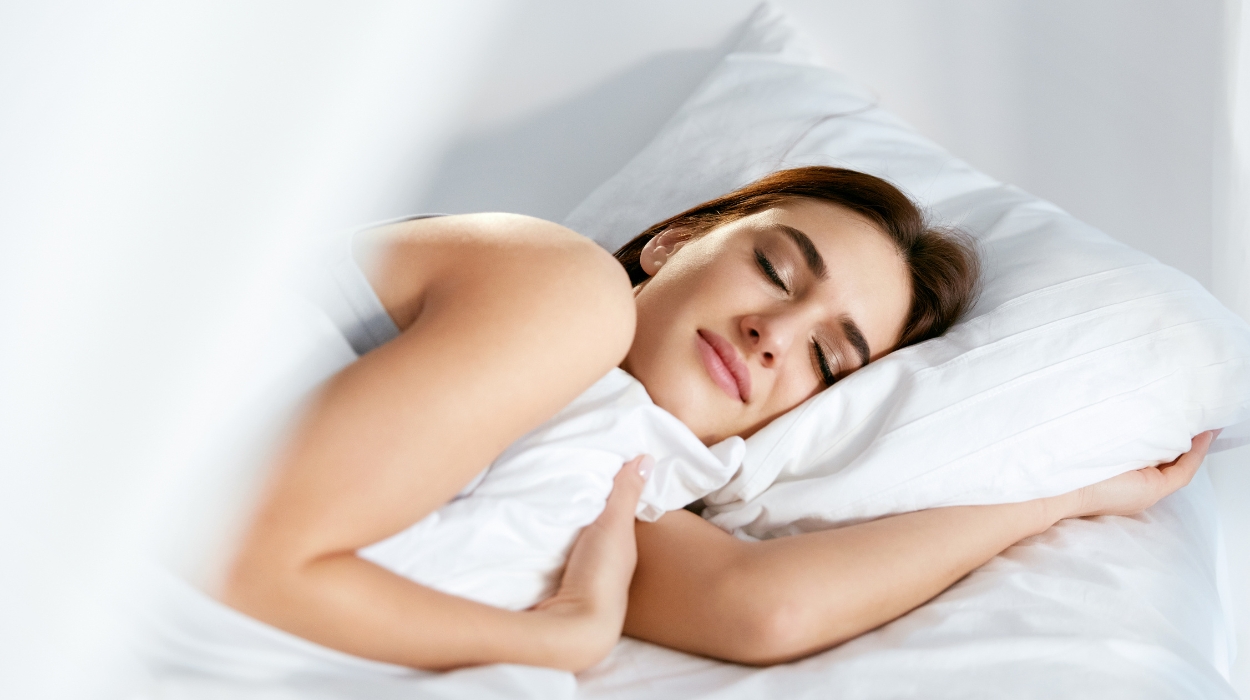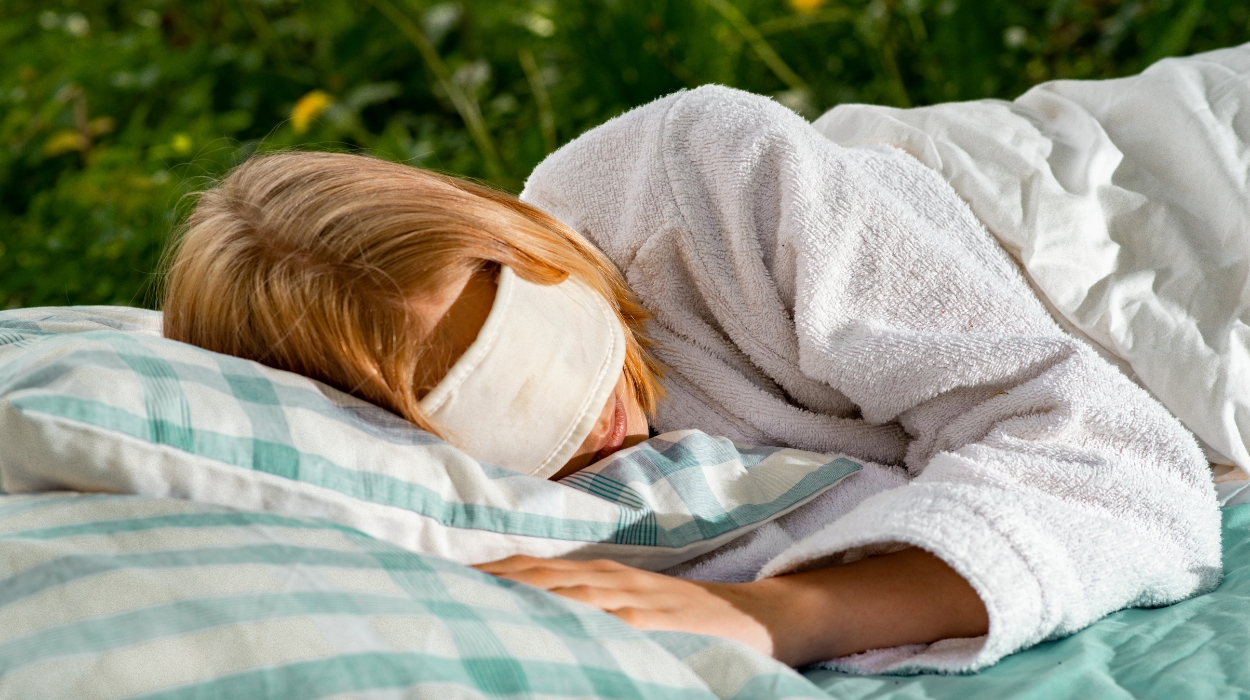How To Sleep Better With Anxiety: 8 Tips For Anxiety & Sleep Management

Instead of winding down for a good night’s sleep, are the thoughts in your head racing and you just don’t know how to get to sleep?? As you switch off the lights and adjust yourself in bed, your brain might just be the one refusing to switch off. And, as much as you might try it, staring wide-eyed at the ceiling anticipating tomorrow’s wave of worries won’t miraculously dissolve your fears.
For many, mental health is a serious barrier to achieving a good night’s sleep. According to the Anxiety and Depression Association of America (ADAA), anxiety disorders are the most common mental illness in the U.S. and affect a staggering 40 million adults[1] in the U.S. alone.
Anxiety at night disrupts sleep and causes sleep disorders – So how can we address this vicious cycle? This article looks at the association between the two and provides ways to help you sleep better if you have an anxiety disorder.
How To Fall Asleep When Anxious
Sleep, as we all know, is essential for general good health. Insufficient sleep affects us physically, emotionally, and mentally, contributing to mood and behavioral problems[2], irritability, and even depression association. Studies[3] show that a lack of sleep increases anxiety, and anxiety causes sleep disruptions, presenting a vicious cycle. Unfortunately, everyone feels anxious at some point in their lives, whether it’s moving to a new place, welcoming home a new family member, or starting a new job. But for those with anxiety disorders, falling asleep and getting at least six core hours of sleep[4] each night is a rare occurrence and one difficult to achieve. However, sleep deprivation can be solved based on a nonpharmacological treatment called cognitive behavior therapy[5].
8 Tips For Anxiety & Sleep Management
- Keep to a regular routine
- Get natural daylight
- Keep the bedroom dark, cool, and quiet
- Find ways to relax before bed
- Stay active during the day
- Avoid caffeine, alcohol, and other stimulants
- Avoid electronic devices before bed
- Don’t prolong your stay in bed if you are awake
8 Tips To Sleep Better With Anxiety
Keep To A Regular Routine

A regular daily routine keeps us focused and helps sustain our body’s internal clock, keeping our circadian rhythms in sync[6]. Try to maintain some control of your sleep-wake cycle by managing your bedtime routine and waking up at the same time each day, particularly on weekends and holidays. Eating meals and exercising at the same time each day keeps us in check and helps us to prepare the body to fall asleep faster.
Get Natural Light
Getting natural light[6] can positively impact mental and physical well-being. Spending time outside during daylight hours, such as going for a quiet walk, works wonders for our bodies and helps set our sleep patterns.
Sometimes simply placing yourself next to an open window and breathing in the fresh air can reset your internal body clock. This will make you more alert during the day and more relaxed in the evening when it’s darker.
Keep The Bedroom Dark, Cool, And Quiet
Simple measures such as keeping the bedroom free from clutter and in a cool, dark, and calm environment[7] are vital in getting a better rest. Consider using blackout blinds that block out light from the outside, particularly if you are an early riser and have difficulty getting back to sleep again. Avoid using an uncomfortable mattress, and weighted blankets can be helpful for sleep quality. Bedding, mattresses, and pillows[7] should be supportive and comfortable. Good sleepwear that regulates body heat will improve your sleep.
Find Ways To Relax Before Bed
Allowing time to relax and wind down at the end of the day can be beneficial when you’re feeling stressed and anxious. Listening to soothing music[8], reading, or having a hot-warm bath can help your body wind down before bed. You can try to practice meditation which is also a good way to relax your mind to have a good night’s sleep. Some find light meditation[9], deep breathing exercises, or other relaxation techniques to make it easier to settle into bed. Do whatever feels good and relax before going to bed.
Stay Active During The Day
Regular exercise[10] uses up energy stored in the body, sufficiently tiring it for the end of the day, and improving sleep. You don’t need to go to the gym; Build in physical activity in your daily routine by dancing to music, taking a quick stroll outside, or doing extra chores around the house.
Not only does exercise release endorphins[9] which are feel-good hormones that help to alleviate mood; but It also improves cardiac and muscle strength, lowers blood pressure, and helps relieve stress and anxiety[11].
However, try to avoid exercising too close to bedtime and avoid napping during the day.
Avoid Caffeine, Alcohol, And Other Stimulants
We are a coffee-loving nation, and we drink to keep ourselves awake and increase our mental performance. However, stimulants such as caffeine found in coffee, tea, chocolate, and some soft drinks, may negatively affect subsequent sleep[12], resulting instead in daytime sleepiness.
Eating or drinking large amounts immediately before bed can induce heartburn. Heartburn is a burning-like sensation radiating upwards between the rib cage caused by the upward travel of stomach acid, which can be worse in the evening[13] when lying down to sleep.
While an occasional glass of wine may initially help you fall asleep quicker, too much alcohol[14] negatively affects sleep quality, making you feel insufficiently rested upon waking the following morning.
Some medicines may have side effects that cause insomnia or other sleep disruptions. Check these with your doctor or pharmacist and switch to alternatives where possible.
Avoid Electronic Devices Before Bed
Although reading is relaxing, eReaders and other electronic devices that emit blue light[15] (televisions, computers, tablets) keep us awake and more alert, affecting our circadian timing, and making it challenging to adjust to sleeping. Therefore, a practical way to have a better night’s sleep is to limit screen time.
Don’t Prolong Your Stay In Bed If You Are Awake
From time to time, we all experience a night of poor sleep and may try to compensate by staying in bed longer the following morning or going to sleep earlier that evening. But studies[16] show that lying awake in bed for prolonged periods psychologically affects the brain, resulting in even worse sleep on subsequent nights. Break this cycle by getting out of bed when you can’t sleep and doing something to help you switch off and relax, only returning to bed when you feel sufficiently sleepy.
Anxiety Disorders
Our busy lives never stop, with new situations that bring us fears and worries, affecting our mental well-being. Minor stresses are inevitable and a part of daily life, but excessive, persistent worrying may progress into an anxiety disorder.
Those with nighttime anxiety may fear everyday situations with such intense and excessive panic that maintains the brain in persistent ‘fight or flight’[17] mode for no particular reasons other than daily life stresses.
When we are anxious, adrenaline levels rise higher than usual, tensing up our muscles and increasing our heart rate. This makes it difficult for us to fall asleep and stay asleep and can cause us to wake up too early.
When To Seek Professional Help
Stress and sleep anxiety may not go away independently; it may be necessary to seek talk therapy before anxiety gets worse over time.
Seek help if you have anxiety symptoms, including:
- Your anxiety is overwhelming and becoming increasingly difficult to control.
- Anxiety is causing anxious thoughts which result in suicidal thoughts or behaviors.
- Your sleep disorder is severely affecting your mental and physical ability to function normally in everyday life.
Conclusion
Whilst there are many different methods to improve both sleep quality and quantity, what works for one individual may not work for another. Taking your time to try different strategies and finding the correct one might be just what your brain needs to switch off at night.
+ 17 sources
Health Canal avoids using tertiary references. We have strict sourcing guidelines and rely on peer-reviewed studies, academic researches from medical associations and institutions. To ensure the accuracy of articles in Health Canal, you can read more about the editorial process here
- Adaa.org. (2020). Facts & Statistics | Anxiety and Depression Association of America, ADAA. [online] Available at: https://adaa.org/understanding-anxiety/facts-statistics.
- Goldstein, A. and Walker, M.C. (2014). The Role of Sleep in Emotional Brain Function. [online] 10(1), pp.679–708. doi:https://doi.org/10.1146/annurev-clinpsy-032813-153716.
- Gabriel Natan Pires, Andréia Gomes Bezerra, Tufik, S. and Andersen, M.L. (2016). Effects of acute sleep deprivation on state anxiety levels: a systematic review and meta-analysis. [online] 24, pp.109–118. doi:https://doi.org/10.1016/j.sleep.2016.07.019.
- Science. (2023). How Much Sleep Do We Need? [online] Available at: https://www.science.org/doi/abs/10.1126/science.1178713.
- Rossman, J.J. (2019). Cognitive-Behavioral Therapy for Insomnia: An Effective and Underutilized Treatment for Insomnia. [online] 13(6), pp.544–547. doi:https://doi.org/10.1177/1559827619867677.
- Pavlova, M. (2017). Circadian Rhythm Sleep-Wake Disorders. [online] 23(4), pp.1051–1063. doi:https://doi.org/10.1212/con.0000000000000499.
- Troynikov, O., Christopher J.E. Watson and Nawaz, N. (2018). Sleep environments and sleep physiology: A review. [online] 78, pp.192–203. doi:https://doi.org/10.1016/j.jtherbio.2018.09.012.
- Maren Jasmin Cordi, Ackermann, S. and Rasch, B. (2019). Effects of Relaxing Music on Healthy Sleep. [online] 9(1). doi:https://doi.org/10.1038/s41598-019-45608-y.
- Adaa.org. (2023). Exercise for Stress and Anxiety | Anxiety and Depression Association of America, ADAA. [online] Available at: https://adaa.org/living-with-anxiety/managing-anxiety/exercise-stress-and-anxiety.
- Kelley, G.A. and Kelley, K.S. (2017). Exercise and sleep: a systematic review of previous meta-analyses. [online] 10(1), pp.26–36. doi:https://doi.org/10.1111/jebm.12236.
- Kaushadh Jayakody, Shalmini Gunadasa and Hosker, C. (2013). Exercise for anxiety disorders: systematic review. [online] 48(3), pp.187–196. doi:https://doi.org/10.1136/bjsports-2012-091287.
- Snel, J. and Lorist, M.M. (2011). Effects of caffeine on sleep and cognition. [online] pp.105–117. doi:https://doi.org/10.1016/b978-0-444-53817-8.00006-2.
- Nakahara (2016). [GERD and sleep disturbances]. Nihon rinsho. Japanese journal of clinical medicine, [online] 74(8). Available at: https://pubmed.ncbi.nlm.nih.gov/30562446/.
- Thakkar, M.M., Sharma, R. and Sahota, P. (2015). Alcohol disrupts sleep homeostasis. [online] 49(4), pp.299–310. doi:https://doi.org/10.1016/j.alcohol.2014.07.019.
- Chang, A.B., Aeschbach, D., Duffy, J.F. and Czeisler, C.A. (2014). Evening use of light-emitting eReaders negatively affects sleep, circadian timing, and next-morning alertness. [online] 112(4), pp.1232–1237. doi:https://doi.org/10.1073/pnas.1418490112.
- Buysse, D.J., Cheng, Y., Germain, A., Moul, D.E., Franzen, P.L., Fletcher, M.A. and Monk, T.H. (2010). Night-to-night sleep variability in older adults with and without chronic insomnia. [online] 11(1), pp.56–64. doi:https://doi.org/10.1016/j.sleep.2009.02.010.
- Mayo Clinic. (2018). Anxiety disorders – Symptoms and causes. [online] Available at: https://www.mayoclinic.org/diseases-conditions/anxiety/symptoms-causes/syc-20350961.



